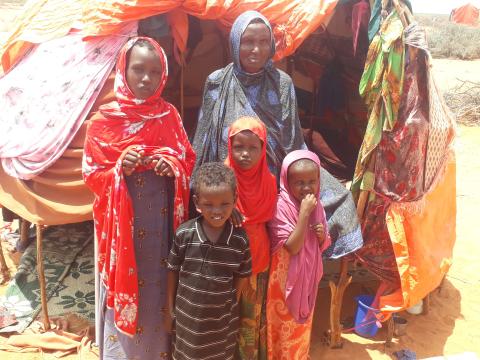World Vision intensifies Somalia drought response to meet rising needs

In February 2022, World Vision intensified its response to the ongoing drought crisis in parts of Somalia and Somaliland, aiming to reach nearly 356,000 people facing food insecurity as well as challenges linked to lack of or limited access to nutrition, health, water and hygiene.
Eighty-year-old Habiba is a widow originally from Dinsoor district in the Bay region of Somalia. Her family moved to Lasaanood 20 years ago after they lost all their livestock to recurring droughts. In addition, Habiba says she suffered eviction from their family land. Hers was among over 1,000 families who were forcefully displaced from the Lasaanood district.
During the unexpected removal from their Lasaanood home, Habiba was the sole provider and custodian of her five grandchildren left behind when their mother died. The children are between the ages of two to six years. In the round-up, they were not allowed to pick their household items such as cooking pots and pans, cups and plates.
“It was such an unfortunate move by the authorities. Imagine we are all Somalis, and today I’m a refugee in my own country. I wished I died rather than to suffer like this in my sunset years”, Habiba tells us.
When they arrived in Galkayo in Puntland, Somalia, they were welcomed by well-wishers who provided them with food and ushered them to join other Internally Displaced Persons (IDPs) who were already settled in Jeexdin IDP camp. The camp is currently hosting over 700 households, with more displaced families coming in from Lasaanood.
But, it is not just the displaced families who are settled in the camp, the local communities who have lost their livestock to the current drought are also coming into the camp daily to see if they can get food for their starving families from agencies like World Vision.
Children are among the most affected, with their health, nutrition and well-being at heightened risk. According to UNOCHA, more than 3.9 million children are struggling to get enough to eat. The risk of diseases for people living in temporary shelters with poor sanitation has also increased.
World Vision among agencies on the ground responding
Habiba's is among the 264 households who have benefitted from World Vision’s unconditional cash transfer programme, meant to provide emergency life-saving relief to the most vulnerable. It targets critically vulnerable IDP communities in the Galkayo district of Puntland.
The project is funded by Irish Aid and provides US$ 85 per household every month for three months to meet families' daily basic food requirements. The project has also provided training in child protection and distributed dignity kits to 264 women and girls.
“I use all the entitlement I received on food for my large family that I support, and the little remaining cash I use to purchase water which is very scarce”, Habiba shares. Other times, Habiba would use a portion of the money to pay women who can walk long distances to the water sources, to collect water for her.
The camp has only one borehole that supplies clean water. However, due to the drought, it is almost drying up; posing yet another looming challenge for Habiba. The camp management has submitted a request for support in the distribution of water to the IDPs through pipe installation from the source. Unfortunately, no agency has been able to support so far, according to the management.
In the meantime, Habiba and many others facing the effects of this drought are coping the best they can, a day at a time.
"I thank World Vision for coming to our rescue; without them we would have been long gone, particularly old people like me who do not have anyone to support us. I urge you not to stop this support which is my only hope for now”, she concludes.